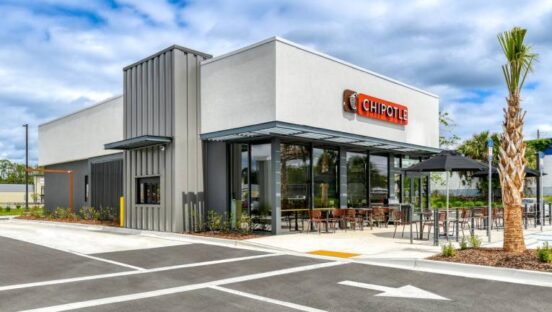Back in early summer 2021, Chipotle CEO Brian Niccol shared with investors details from a recent two-day virtual conference. Roughly 400–500 field leaders oversee some 90,000 employees, and the group began to think broader. Previously, they talked $2.5 million average-unit volumes and growth beyond 2,700 locations to 6,000-plus stores. Those projections bumped to $3 million, with $3.5 million in the not-so-deep future. And 6,000 would soon become 7,000 when Chipotle lifted that projection in February 2022.
But one quieter topic was the fast casual’s international prospects. Niccol noted then Chipotle was “bullish” and just a week earlier, had opened a store in the U.K. and planned to debut “some restaurants in France.” Chipotle also felt there was room for “at least a few hundred restaurants in Canada,” as their unit economics approached U.S. stores. It had recently opened a British Columbia restaurant in Surrey, which marked Chipotle’s first Canadian store in three years.
This was an alluring carrot for investors given Chipotle’s surging awareness and its growing digital levers. In the past, Chipotle tried to grow in France (2012 to start) and gave Germany (August 2013 was the first) a shot. Yet it hit roadblocks. Press reviewers called the food overpriced. However, in the years since, the dynamic has changed overseas, especially in terms of delivery and what it costs consumers to access convenient food.
READ MORE:
Chipotle is Testing a Robot that Can Cut, Core, and Peel Avocados
Chipotle Gets Back to ‘Project Square One’
And as Niccol added, “We as a company have more levers than ever before to be successful in new markets, between our digital system, the varying asset designs that we can bring to the market, and then I think just the strength of the brand around food with integrity and the proposition that comes with that. So I’m bullish on it. But it’s still early days, but it’s going to be part of our growth story in the not too distant future.”
The brand methodically made progress. Stephen Piacentini was hired as chief development officer in May, coming over from the same role at Wendy’s U.S. business.
As the company revealed Tuesday, it also formed a new business development group led by Nate Lawton, its chief business development officer, who helped bring the virtual Farmesa brand to market.
The group is now exploring opportunities for growth via outside partnerships, the company said, and is taking proposals on its site. Chief among those targets will be international (all present U.S. stores are corporate owned and operated).
Chipotle on Tuesday announced the signing of its first development agreement in brand history to open stores in the Middle East. It will work with international franchise retail operator Alshaya Group to initially open new units in Dubai and Kuwait early next year before expanding further across the region, Chipotle said.
“Leveraging Alshaya’s market expertise will enable us to quickly gain access to these vibrant economies,” Niccol said Tuesday in a statement. “We are excited to offer guests in the Middle East our responsibly sourced, classically cooked real food, and look forward to furthering our purpose to cultivate a better world in this new territory.”
Chipotle has widened its international footprint since that “bullish” claim. The existing international portfolio includes 33 locations in Canada; 15 in the United Kingdom with three more opening this summer; six locations in France; and two in Germany.
Overall, Chipotle operates north of 3,200 units and is targeting 8–10 percent growth, per year, for the foreseeable future.
At least 80 percent of that plan will include the brand’s order-ahead pickup lane feature, and that doesn’t skip non-domestic. The company recently opened its first “Chipotlane” in Ontario, Canada, and, of its 41 new company-wide new stores in Q1 overall, 34 included the option. Chipotle expects between 255–285 new restaurants this year. So its Chipotlane footprint, which crossed 500 in November 2022, is well on its way to triple-digit territory and beyond.
The Chipotlane shifted the economics of Chipotle’s potential, which is one reason Niccol lifted the AUV goal. Chipotlanes continue to generate higher digital mix by “several hundred basis points,” CFO Jack Hartung said earlier, as well as produce a shift where delivery takes a step down from the high teens to the mid or low tweens. Order ahead steps up from the low 20 percent range to high 20s, or even 30 percent in some spots.
“In announcing this exclusive partnership across the Middle East, we are proud to be Chipotle’s first and only franchise partner, as we continue to enhance our portfolio by bringing world leading brands to our customers across our markets,” said Mohammed Alshaya, executive chairman of Alshaya Group.
Alshaya Group is a family-owned enterprise first established in 1890 in Kuwait. Its company extends across MENA, Türkiye and Europe, with “thousands of stores, cafes, restaurants and leisure destinations, as well as a large scale online and digital business.” Alshaya Group operates in in multiple sectors including fashion, food, health and beauty, pharmacy, home furnishings, and leisure and entertainment. Some of its food operations cover Starbucks, P.F. Chang’s, Pinkberry, Shake Shack, Cheesecake Factory, Blaze Pizza, Bouchon Bakery, Raising Cane’s, and Texas Roadhouse.
Chipotle’s same-store sales lifted 10.9 percent, year-over-year in Q1 fiscal 2023. Total revenue increased 17.2 percent to $2.4 billion.
The brand ended 2022 with 3,129 U.S. locations (all company owned) and domestic systemwide sales of $8.6 billion on AUVs of $2.8 million. It grew by a net 211 units, year-over-year, in the U.S.









